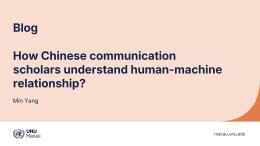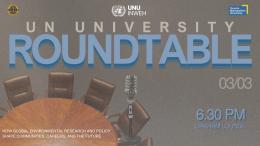On 16 September 2023 at 09:30 (New York / UTC-4), the United Nations University and Dresden University of Technology will co-organize "Leveraging Postgraduate Education for Sustainable Development: The Resource-Nexus and Environmental Management in Global South Partnerships", a side event of SDG Action Weekend in New York. The event will be held in person at the UNU Centre for Policy Research Headquarters in New York and online via Zoom webinar.
Higher education institutions play a crucial role in fostering innovation, research and knowledge transfer that directly impact the attainment of the SDGs. Postgraduate education, in particular, provides a unique opportunity to train and equip the next generation of leaders, researchers and professionals with the necessary skills, knowledge and interdisciplinary perspectives required to address complex global challenges.
The concept of the resource nexus emphasizes the interconnectedness of different resources (e.g., water, energy, food, materials) and the importance of adopting a holistic approach to sustainable development. By promoting collaborations and partnerships with the Global South, we can facilitate knowledge exchange, capacity building, and technology transfer, thus creating a positive ripple effect across regions and addressing common sustainability challenges.
This side event will explore the significant potential of postgraduate education and higher education institutions to contribute towards the achievement of the Sustainable Development Goals (SDGs). The side event will focus on the pivotal role of environmental management and the concept of the resource nexus in partnerships with the Global South, acknowledging the importance of promoting sustainable development practices in developing regions.
Objectives and themes
The main objectives of the side event are to:
-
showcase successful initiatives and case studies where postgraduate education has contributed significantly to advancing the SDGs, particularly in the context of environmental management and resource-nexus applications.
-
discuss the challenges and opportunities associated with implementing postgraduate programs that focus on sustainability and the resource nexus, especially in partnerships with higher education institutions in the Global South.
-
promote collaboration and partnerships between universities, governmental bodies, NGOs, and other stakeholders to enhance the impact of postgraduate education on sustainable development efforts.
The side event will revolve around the following themes and topics:
-
Environmental Management and its Role in Achieving the SDGs
-
The Resource-Nexus: A Holistic Approach to Sustainable Development.
-
Best Practices in Postgraduate Education for Sustainability
-
Case Studies from Global South Partnerships
-
Overcoming Challenges in Implementing Sustainable Postgraduate Programs
-
Strengthening Global Collaborations and Knowledge Exchange
Format and speakers
The side event will be structured as lightning talks with a follow-up panel discussion featuring experts representing various institutions involved in the collaboration above and beyond. Additionally, there will be interactive Q&A sessions to engage the audience and foster meaningful dialogue.
-
Prof. Dr. Tshilidzi Marwala, Rector of the United Nations University and UN Under-Secretary-General, Tokyo, Japan (pre-recorded)
-
Prof. Dr. Shinobu Yamaguchi, Director, UNU-IAS, Tokyo, Japan (in person)
-
Prof. Kaveh Madani, Director, UNU-INWEH, Hamilton, Ontario, Canada (in person)
-
Dr. André Lindner, Managing Director and Advisor Internationalization, School of Civil and Environmental Engineering, Dresden University of Technology, Germany (in person)
-
Prof. Dr. Saleemul Huq, Director, International Centre for Climate Change and Development, Dhaka, Bangladesh (in person)
-
Prof. Dr. Daniel Karthe, Head of Programme, UNU-FLORES, Dresden, Germany (in person)
-
Prof. Dr. Muhammad Fazli Ilahi, Vice Chancellor, Ahsanullah University of Science and Technology (AUST), Dhaka, Bangladesh (virtual)
-
Ralph Wollmann, President Office of the Geman Environment Agency, focal point for the TES Academy, and CIPSEM steering committee member (virtual)
-
Dr. Christina Frömder, Associate Programme Officer, UNU-FLORES, Dresden, Germany (in person)
-
Dr. Saroj Kumar Chapagain, Associate Programme Officer, UNU-FLORES, Dresden, Germany (in person)
-
Representative of the German Agency for International Cooperation (GIZ) (virtual)
Expected outcomes
The side event aims to achieve the following outcomes:
-
increased awareness about the potential of postgraduate education in addressing sustainable development challenges;
-
identification of key strategies and best practices for integrating environmental management and resource-nexus concepts into postgraduate curricula; and
-
strengthened partnerships and collaborations between higher education institutions in the Global South and other regions, fostering a shared commitment to sustainable





